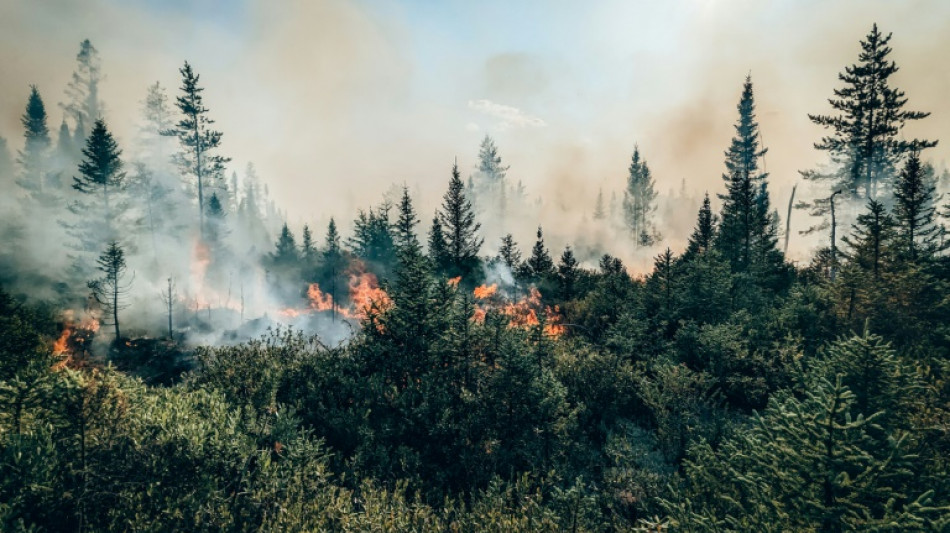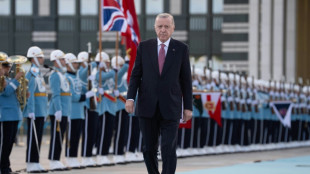
-
 George glad England backed-up haka response with New Zealand win
George glad England backed-up haka response with New Zealand win
-
McIlroy loses playoff but clinches seventh Race to Dubai title

-
 Ecuador votes on reforms as Noboa eyes anti-crime ramp-up
Ecuador votes on reforms as Noboa eyes anti-crime ramp-up
-
Chileans vote in elections dominated by crime, immigration

-
 Turkey seeks to host next COP as co-presidency plans falter
Turkey seeks to host next COP as co-presidency plans falter
-
Bezzecchi claims Valencia MotoGP victory in season-ender

-
 Wasim leads as Pakistan dismiss Sri Lanka for 211 in third ODI
Wasim leads as Pakistan dismiss Sri Lanka for 211 in third ODI
-
Serbia avoiding 'confiscation' of Russian shares in oil firm NIS

-
 Coach Gambhir questions 'technique and temperament' of Indian batters
Coach Gambhir questions 'technique and temperament' of Indian batters
-
Braathen wins Levi slalom for first Brazilian World Cup victory

-
 Rory McIlroy wins seventh Race to Dubai title
Rory McIlroy wins seventh Race to Dubai title
-
Samsung plans $310 bn investment to power AI expansion

-
 Harmer stars as South Africa stun India in low-scoring Test
Harmer stars as South Africa stun India in low-scoring Test
-
Mitchell ton steers New Zealand to seven-run win in first Windies ODI

-
 Harmer stars as South Africa bowl out India for 93 to win Test
Harmer stars as South Africa bowl out India for 93 to win Test
-
China authorities approve arrest of ex-abbot of Shaolin Temple

-
 Clashes erupt in Mexico City anti-crime protests, injuring 120
Clashes erupt in Mexico City anti-crime protests, injuring 120
-
India, without Gill, 10-2 at lunch chasing 124 to beat S.Africa

-
 Bavuma fifty makes India chase 124 in first Test
Bavuma fifty makes India chase 124 in first Test
-
Mitchell ton lifts New Zealand to 269-7 in first Windies ODI

-
 Ex-abbot of China's Shaolin Temple arrested for embezzlement
Ex-abbot of China's Shaolin Temple arrested for embezzlement
-
Doncic scores 41 to propel Lakers to NBA win over Bucks

-
 Colombia beats New Zealand 2-1 in friendly clash
Colombia beats New Zealand 2-1 in friendly clash
-
France's Aymoz wins Skate America men's gold as Tomono falters

-
 Gambling ads target Indonesian Meta users despite ban
Gambling ads target Indonesian Meta users despite ban
-
Joe Root: England great chases elusive century in Australia

-
 England's Archer in 'happy place', Wood 'full of energy' ahead of Ashes
England's Archer in 'happy place', Wood 'full of energy' ahead of Ashes
-
Luxury houses eye India, but barriers remain

-
 Budget coffee start-up leaves bitter taste in Berlin
Budget coffee start-up leaves bitter taste in Berlin
-
Reyna, Balogun on target for USA in 2-1 win over Paraguay

-
 Japa's Miura and Kihara capture Skate America pairs gold
Japa's Miura and Kihara capture Skate America pairs gold
-
Who can qualify for 2026 World Cup in final round of European qualifiers

-
 UK to cut protections for refugees under asylum 'overhaul'
UK to cut protections for refugees under asylum 'overhaul'
-
England's Tuchel plays down records before final World Cup qualifier

-
 Depoortere double helps France hold off spirited Fiji
Depoortere double helps France hold off spirited Fiji
-
Scotland face World Cup shootout against Denmark after Greece defeat

-
 Hansen hat-trick inspires Irish to record win over Australia
Hansen hat-trick inspires Irish to record win over Australia
-
Alcaraz secures ATP Finals showdown with 'favourite' Sinner

-
 UK to cut protections for refugees under asylum 'overhaul': govt
UK to cut protections for refugees under asylum 'overhaul': govt
-
Spain, Switzerland on World Cup brink as Belgium also made to wait

-
 Sweden's Grant leads by one at LPGA Annika tournament
Sweden's Grant leads by one at LPGA Annika tournament
-
Scotland cling to hopes of automatic World Cup qualification despite Greece defeat

-
 Alcaraz secures ATP Finals showdown with great rival Sinner
Alcaraz secures ATP Finals showdown with great rival Sinner
-
England captain Itoje savours 'special' New Zealand win

-
 Wales's Evans denies Japan historic win with last-gasp penalty
Wales's Evans denies Japan historic win with last-gasp penalty
-
Zelensky renews calls for more air defence after deadly strike on Kyiv

-
 NBA's struggling Pelicans sack coach Willie Green
NBA's struggling Pelicans sack coach Willie Green
-
Petain tribute comments raise 'revisionist' storm in France

-
 Spain on World Cup brink as Belgium also made to wait
Spain on World Cup brink as Belgium also made to wait
-
Spain virtually seal World Cup qualification in Georgia romp


Climate change supercharged 'fire weather' behind Canada blazes
Human-caused climate change made 2023's severe, months-long "fire weather" conditions that powered Canada's record-breaking blazes at least seven times more likely to happen, according to a new scientific analysis published Tuesday.
The study by the World Weather Attribution group also found that over the year, fire-prone conditions were 50 percent more intense as a result of global warming, primarily a result of burning fossil fuels.
"As we continue to warm the planet, these kinds of events are going to get more frequent and they're going to get more intense," first author Clair Barnes, an environmental statistician at Imperial College London, told AFP.
Canada is experiencing its most devastating fire season ever, a result of record high temperatures, low humidity and early thaw of snow melt. Nearly 15.3 million hectares (37.8 million acres) have burned: an area larger than Greece, and more than double the previous 1989 record.
Some 200,000 people have been evacuated, at least four have died, and smoke from the burning forests has led to dangerous air pollution spreading across much of Canada and the United States to the south -- driving spikes in emergency department visits and even school closures.
As of late July, the forest fires had directly emitted more than a billion tons of carbon dioxide into the atmosphere as well as methane and nitrous oxide that had a combined greenhouse effect equivalent of a further 110 million tons of carbon dioxide, according to recent research.
For the current study, scientists examined the eastern province of Quebec, honing in on zones that are similar in climate and vegetation. The region saw an exceptionally high number of fires in May and June, when national temperature records were smashed by 0.8 degrees Celsius (1.4 degrees Fahrenheit).
Because wildfires are highly complex and not driven solely by climate, the researchers focused instead on conditions conducive to blazes, using a metric called the Fire Weather Index (FWI).
This combines temperature, wind speed, humidity and precipitation. The team accumulated this data from January to July to derive a measure of severity of fire weather over the entire season.
While Quebec's fires were unprecedented, analysis of the recent climate record indicated the seasonal conditions causing the blazes are no longer rare, occurring once every 25 years. This means they now have a four percent chance of happening every year.
To understand the contribution of man-made global warming, they used computer model simulations to compare the climate as it is today, after about 1.2C (2.2F) of global warming since the late 1800s, with the climate of the past.
This showed climate change had made seasons of this severity at least seven times more likely to occur compared to pre-industrial times. Barnes stressed, however, that this was a lower-bound estimate, with the researchers choosing to be conservative in the face of statistical uncertainty.
- Indigenous communities hit hardest -
Yan Boulanger, an ecologist with the Canadian Forest Service and the report's second author, told AFP the cumulative impact of circumstances favorable to fire was key. "It's because those fire weather conditions lasted so long that those fires could grow so big."
The team also identified the seven-day-stretch when fire weather conditions were at their highest, and found such peak conditions were more than twice as likely to occur than in the past, as a result of climate change.
If the world continues burning fossil fuels at high rates, the likelihood and intensity of severe fire weather conditions will only increase, the analysis showed.
These fires imperil the future of the forestry sector, Boulanger warned, with a question mark over whether regeneration efforts can keep up with losses.
The most impacted communities meanwhile are remote and have relatively few resources, including Indigenous peoples, who made up 75 percent of those evacuated in July.
"This increasing severity of extreme events and likelihood of extreme events is not going to stop until we reach net zero and stop adding extra greenhouse gasses into the atmosphere," said Barnes, adding it's "not too late" to lobby political leaders to change course.
T.Ibrahim--SF-PST




